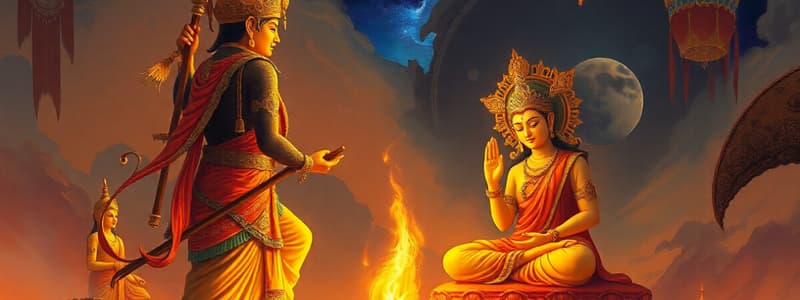Podcast
Questions and Answers
What was the primary goal in Hinduism for an individual?
What was the primary goal in Hinduism for an individual?
- To spread religious teachings
- To attain social equality
- To fulfill caste duty and unite with Brahma (correct)
- To achieve material wealth
What concept in Hinduism refers to the duties of an individual based on their caste?
What concept in Hinduism refers to the duties of an individual based on their caste?
- Samsara
- Nirvana
- Karma
- Dharma (correct)
What was a significant reason for the emergence of Buddhism in contrast to Hinduism?
What was a significant reason for the emergence of Buddhism in contrast to Hinduism?
- Buddhism offered an opportunity for caste advancement (correct)
- Buddhism rejected the idea of rebirth
- Buddhism encouraged a hierarchical social structure
- Hinduism promoted wealth accumulation
Which of the following best describes the cycle of rebirth in Hinduism?
Which of the following best describes the cycle of rebirth in Hinduism?
What role did the Maurya Empire play in the spread of Buddhism?
What role did the Maurya Empire play in the spread of Buddhism?
How did Siddhartha Gautama view the nature of life?
How did Siddhartha Gautama view the nature of life?
What is nirvana in Buddhism?
What is nirvana in Buddhism?
What type of system emerged in India as a consequence of Hindu beliefs?
What type of system emerged in India as a consequence of Hindu beliefs?
What was one of the key features of Zoroastrianism?
What was one of the key features of Zoroastrianism?
Who is considered the supreme creator in Zoroastrianism?
Who is considered the supreme creator in Zoroastrianism?
How did Ashoka the Great influence Buddhism?
How did Ashoka the Great influence Buddhism?
What is one aspect that Zoroaster emphasized in his teachings?
What is one aspect that Zoroaster emphasized in his teachings?
Which written text codifies the beliefs of Judaism?
Which written text codifies the beliefs of Judaism?
What significant change occurred in Judaism after exposure to Zoroastrianism?
What significant change occurred in Judaism after exposure to Zoroastrianism?
What theme in Zoroastrianism involves a future redeemer?
What theme in Zoroastrianism involves a future redeemer?
Which religion was notably influenced by Zoroastrianism?
Which religion was notably influenced by Zoroastrianism?
What key feature of Judaism emphasizes the choice between Good and Evil?
What key feature of Judaism emphasizes the choice between Good and Evil?
What marked the beginning of the teachings of Christianity?
What marked the beginning of the teachings of Christianity?
What was Jesus of Nazareth viewed as in the context of Jewish beliefs?
What was Jesus of Nazareth viewed as in the context of Jewish beliefs?
What was one of the main challenges faced by early Christianity?
What was one of the main challenges faced by early Christianity?
Which philosophical approach aimed to promote unity in response to disorder in China?
Which philosophical approach aimed to promote unity in response to disorder in China?
What document codified the teachings of Confucius?
What document codified the teachings of Confucius?
What aspect of Jesus' message did the Roman Empire find particularly threatening?
What aspect of Jesus' message did the Roman Empire find particularly threatening?
What was a significant outcome of the missionary work of Paul of Tarsus?
What was a significant outcome of the missionary work of Paul of Tarsus?
Flashcards
Hinduism
Hinduism
A system of beliefs and practices developed from the Vedas, considered one of the oldest organized religions in the world.
Vedas
Vedas
The first written collection of Vedic hymns and rituals, marking a significant step in the development of Hinduism.
Uniting with Brahma
Uniting with Brahma
The ultimate goal of Hinduism, achieved through fulfilling one's caste duties and accumulating good karma.
Dharma
Dharma
Signup and view all the flashcards
Caste System
Caste System
Signup and view all the flashcards
Buddhism
Buddhism
Signup and view all the flashcards
Nirvana
Nirvana
Signup and view all the flashcards
The Pre-Mauryan Era
The Pre-Mauryan Era
Signup and view all the flashcards
Monotheism
Monotheism
Signup and view all the flashcards
Zoroastrianism
Zoroastrianism
Signup and view all the flashcards
Universal Battle Between Good and Evil
Universal Battle Between Good and Evil
Signup and view all the flashcards
Ahura Mazda
Ahura Mazda
Signup and view all the flashcards
Second-Temple Judaism
Second-Temple Judaism
Signup and view all the flashcards
Tanakh
Tanakh
Signup and view all the flashcards
Transitioning to Monotheism
Transitioning to Monotheism
Signup and view all the flashcards
Zoroastrianism's influence on Judaism
Zoroastrianism's influence on Judaism
Signup and view all the flashcards
Eternal Battle between Good and Evil
Eternal Battle between Good and Evil
Signup and view all the flashcards
Free Will
Free Will
Signup and view all the flashcards
Messiah
Messiah
Signup and view all the flashcards
Jesus as Messiah
Jesus as Messiah
Signup and view all the flashcards
Incarnation
Incarnation
Signup and view all the flashcards
Missionary
Missionary
Signup and view all the flashcards
Missionary Work
Missionary Work
Signup and view all the flashcards
Study Notes
Hinduism in the Indian Subcontinent
- Indo-Aryan invaders from Eurasia displaced Indus civilizations, bringing Vedic religions (2000-1500 BCE).
- Vedic beliefs codified into writing (Vedas) by 700 BCE, forming Hinduism, potentially the oldest organized religion.
- Hinduism cycles through rebirth and reincarnation, aiming for union with Brahma (the universe).
- Dharma: fulfilling one's caste duty, regardless of difficulty.
- Karma: good actions lead to better rebirths.
- Caste system emerged as a rigid social structure.
Buddhism and the Mauryan Empire
- Siddhartha Gautama, a response to Hinduism's rigid caste system, founded Buddhism in northeast India.
- Buddhism emphasizes suffering caused by desire and greed.
- Nirvana: transcendence from desires, ending rebirth.
- Buddhism challenges material lifestyles.
- Initially unpopular with rulers, Buddhism spread through Asia under the Mauryan Empire (322-185 BCE), particularly under Ashoka the Great.
Zoroastrianism
- Zoroastrianism, a monotheistic religion, emerged in Persia (5th century BCE).
- Central figure: Ahura Mazda, the supreme creator.
- Emphasis on a universal battle between Good and Evil.
- Humans have free will to choose sides.
- A future messiah will tip the scales towards Good.
- Zoroaster taught ethical living, gender equality, and charity.
- Significant influence on Persian empires.
Second-Temple Judaism
- Judaism's roots predate written records, but written roots date back to the 6th century BCE.
- Judaism transitioned to a more Zoroastrian model (Second-Temple):
- Monotheism (Yahweh as supreme creator).
- Continuous struggle between good and evil.
- Human choice influenced by good or evil.
- A future messiah leading to victory of good.
- Cyrus the Great's funding of a temple in Jerusalem contributed to this transformation.
- Incorporated elements from Mesopotamian religions before Persian influence.
Christianity
- Christianity emerged from Judaism in the first century CE.
- Based on the teachings and miracles of Jesus of Nazareth, believed to be the Messiah.
- The Roman Empire initially opposed Christianity due to its popularity and potential for revolt.
- Missionaries like Paul of Tarsus helped spread Christianity within the Roman Empire.
- Christianity spread throughout the Roman Empire and beyond.
Confucianism
- Confucianism, a philosophy from 551-479 BCE, emerged as a solution to societal chaos in warring states periods in China.
- Confucianism's core tenets emphasized social harmony through hierarchical structures.
- Individual, family, and state are linked through duty and respected authority.
- Emphasized education, honesty, morality and hierarchical loyalty.
- Promoted family and individual models to emulate those higher up in society.
- Became a dominant philosophy in China.
Studying That Suits You
Use AI to generate personalized quizzes and flashcards to suit your learning preferences.
Related Documents
Description
Explore the key concepts and historical development of Hinduism, Buddhism, and Zoroastrianism in the Indian subcontinent. This quiz covers the essential beliefs and the impact of these religions on society, culture, and history. Test your understanding of the origins, principles, and evolution of these ancient faiths.




